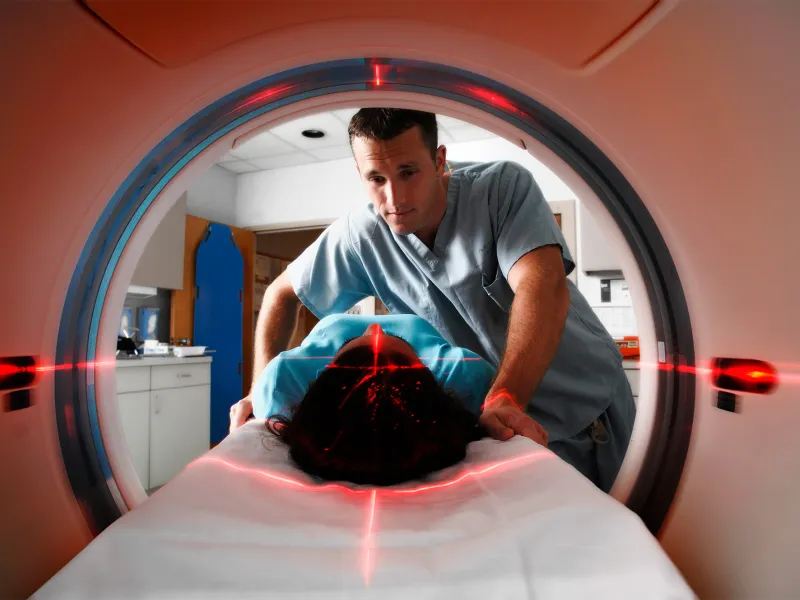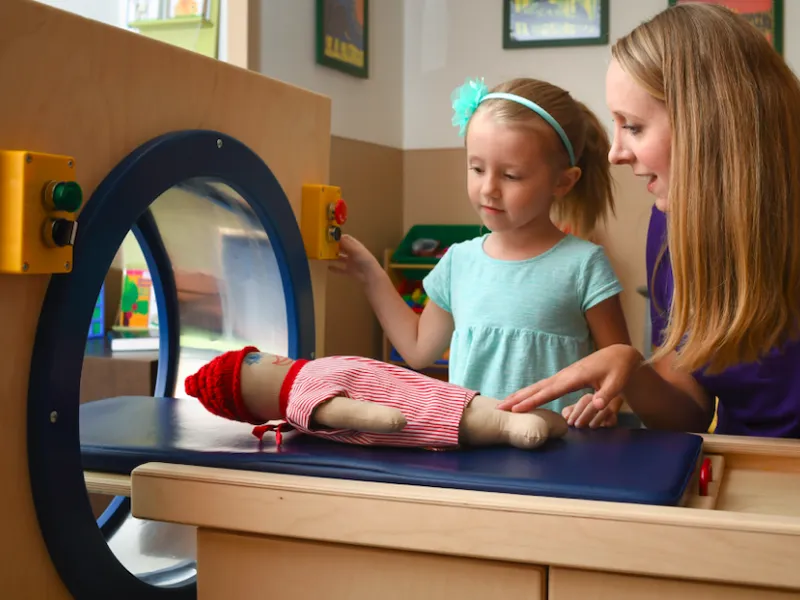
Offering You Exceptional Imaging Care
Your test is our most important task. Whether you need a simple X-ray or a complex interventional radiology treatment, you’ll have the highest level of care, from each provider, every step of the way.

Leading-Edge Imaging Technology to Help Keep You Safe
Nothing is more important to us than your safety. That’s why AdventHealth uses the most current digital equipment to obtain high-quality diagnostic images in the safest possible manner.
Multiple national studies have shown that significant technological advances in equipment have greatly reduced the radiation dose required to obtain images. Because of this, lead shielding that was necessary in the past now has little to no benefit in reducing radiation exposure during imaging procedures. Therefore, in keeping with the current guidelines, we no longer use lead shielding at our facilities.
A Full Suite of Imaging Tests
- Bone Density Scan (DXA)
-
A dual-energy X-ray absorptiometry (DXA) scan is an enhanced X-ray technology used to measure bone loss and diagnose osteoporosis. This painless scan can also assess your risk of developing fractures — especially when combined with a trabecular bone score (TBS).
A TBS included with your DXA scan allows your doctor to assess your risk of fractures more accurately, with no additional radiation or time needed. Compared to a DXA scan alone, a TBS and a DXA scan together can better identify your risk of an osteoporotic fracture, leading to a more accurate diagnosis, earlier prevention and faster treatment. Ask your doctor for a referral for a DXA scan with a TBS.
- Computed Tomography (CT) Scan
-
Combining the use of high-tech computer systems and X-rays to take specialized images of your brain, organs and bones, CT scans produce clearer images and reveal more detail than X-rays alone. That’s why doctors find them beneficial for diagnosing any medical conditions.
We also perform CT Colonography, a minimally invasive procedure (also called a virtual colonoscopy) that uses a CT scan to take detailed images of your organs and provide a full view of your colon and rectum.
- Interventional Radiology (IR)
-
This specialized area of radiology uses X-ray, fluoroscopy, ultrasound and other imaging technologies to treat a variety of medical conditions without surgery. These minimally invasive procedures include biopsies, inserting venous access devices, draining fluids and opening narrowed blood vessels.
- Magnetic Resonance Imaging (MRI)
-
Using a powerful magnetic field, radio-frequency pulses and a high-tech computer, technicians can produce detailed pictures of organs, soft tissue and bone to help your doctor diagnose any medical conditions. There’s no exposure to radiation with an MRI, and it’s among the safest and most versatile of imaging methods.
- Mammography
-
There are two types of mammograms: screening and diagnostic. A screening mammogram is an annual preventative screening for women age 40 and older who haven’t experienced any abnormal breast symptoms. A diagnostic mammogram is typically for women who display symptoms that need to be investigated, such as a breast lump or nipple discharge. Rest assured that you will receive high quality breast imaging care with access to 3D mammography.
- MR-Guided Focused Ultrasound
-
MR-guided focused ultrasound is approved for the treatment of essential tremor that cannot be controlled with medication. Approval is for treatment of one side of the brain only; you must be at least 22 years old. It is also available for tremor-dominant Parkinson’s disease. Approval is for treatment of one side of the brain only; you must be at least 30 years old.
This method uses magnetic resonance imaging (MRI) technology to give your surgeon a clear view of your brain during the procedure. Guided by the MRI, ultrasound waves are concentrated and focused on the specific area of the brain causing your tremors. The beams are able to precisely heat and ablate the targeted areas of tissue without damaging any surrounding areas. This incisionless procedure interrupts the abnormal brain activity that’s causing your tremors.
MR-guided focused ultrasound is an outpatient procedure that follows a personalized plan delivered in one single session. This procedure typically provides immediate tremor improvement in the treated hand with minimal complications. Most patients go home within 23 hours.
Benefits:
- Incisionless outpatient procedure – you can go home the same day
- Unique and personalized plan designed for you
- Immediate tremor improvement
- No referral needed
As always, talk to your doctor about whether this treatment option may be effective for your unique symptoms and condition. You should have a detailed conversation with your physician regarding the risks and benefits of treatment options prior to treatment.
AdventHealth Celebration has contracted with INSIGHTEC, the device manufacturer, to provide its patients with assistance in taking the required first steps to access the MR-guided focused ultrasound treatment, including assistance with initial screening, setting up a meeting with the treatment team, scheduling a CT scan and, for qualifying patients, coordination of the MR-guided focused ultrasound treatment at AdventHealth Celebration.
For more information, call Call800-662-0196 or visit AdventHealthNeuroInstitute.com.
- Nuclear Medicine
-
A special branch of imaging, nuclear medicine uses tiny amounts of radioactive substances called radiotracers to diagnose disease and evaluate functions within your body. Taken orally or by intravenous (IV) injection, radiotracers accumulate in targeted organs or tissue where they give off energy that can be captured by a gamma camera.
- PET-CT scan
-
If it’s suspected you have a tumor, a PET-CT scan can help your doctor detect it, and better determine whether it’s malignant (cancerous) or benign (not cancerous). PET-CT technology
can locate masses nearly three times smaller than those visible on traditional scans.
- Ultrasound
-
Ultrasound imaging provides your doctor a way to see pictures of the inside of your body. And because ultrasound images are captured in real time, they can show the structure and movement of your body’s internal organs, as well as blood flowing through your blood vessels — helping to diagnose and treat any medical conditions.
Conventional ultrasound displays the images in thin, flat sections of the body. Advancements in ultrasound technology include three-dimensional (3D) ultrasound that formats the sound wave data into 3D images. Four-dimensional (4D) ultrasound shows a 3D ultrasound in motion.
- Women's Imaging
-
Women have unique imaging needs — from routine mammograms and bone density scans to fertility tests and the monitoring of fetal development. We offer a full range of women’s imaging services, and are specially trained to deliver high quality care in a welcoming and caring environment.
- X-ray
-
Producing a two-dimensional image of the inside of your body, X-ray technology is a quick and effective imaging tool to assist your doctor in diagnosing any medical conditions. The X-ray beam passes through your body and is captured on a computerized detector.
If needed, your doctor can also request a real-time X-ray (fluoroscopy). This produces a moving image of your body’s functioning organs, such as your gastrointestinal or urinary tract.

Pediatric Imaging Specially Trained for Even the Littlest Patients
AdventHealth for Children provides full-service pediatric imaging services, from general X-ray services to the latest in CT, MRI, ultrasound and nuclear imaging technologies.
Since imaging can be a frightening to a young child, our team of physicians, pediatric technologists, child life specialists and pediatric nursing staff are specially trained to help your child understand their imaging procedure, and put them at ease. And, each of our radiologists is qualified in pediatric radiology, so they can accurately analyze and interpret the images of our littlest patients.
